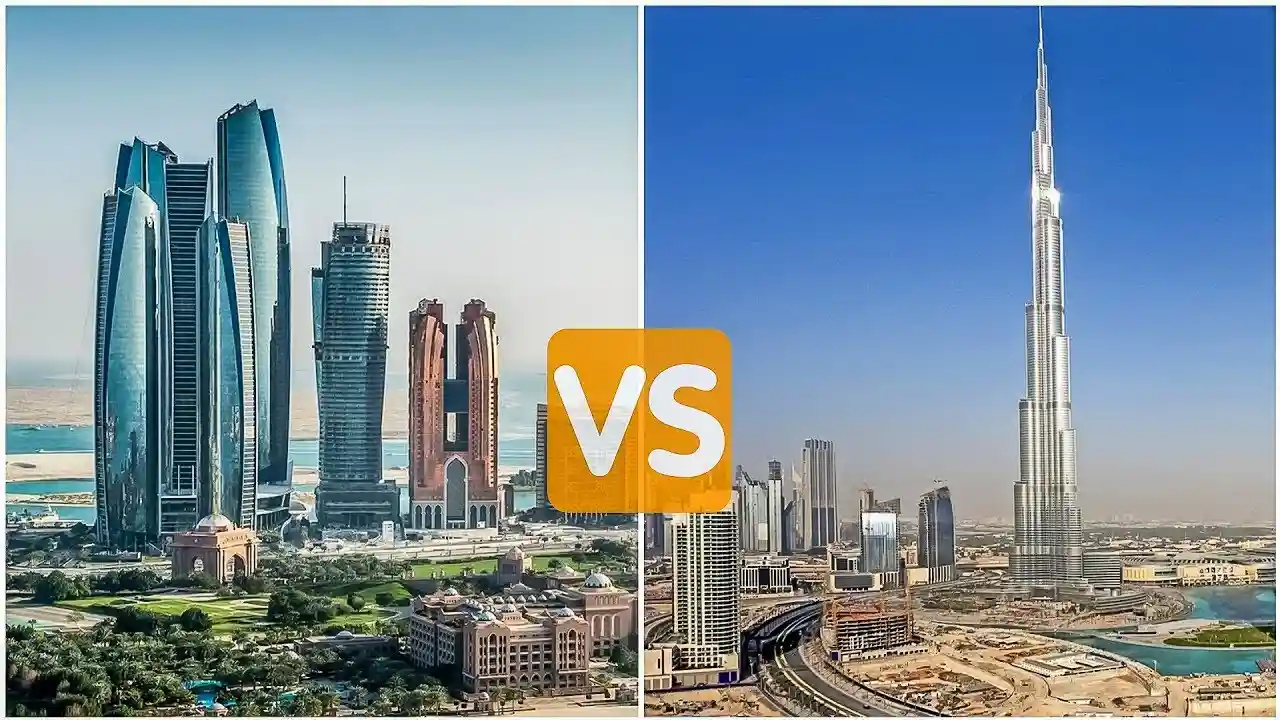
The United Arab Emirates dazzles with two distinct stars, Abu Dhabi and Dubai. At first glance, they seem alike—gleaming skylines, luxury hotels, and world-class attractions—but each carries its own unique pulse. Travelers and potential expats often ask, “Abu Dhabi vs Dubai: which is better?”
The answer, however, isn’t about a winner; it’s about what you seek. One thrives on spectacular innovation, the other on sophisticated substance.
Whether you’re chasing record-breaking skyscrapers or serene cultural experiences, this guide will help you decide which iconic city fits your travel style, lifestyle, and ambitions best.
A Tale of Two Cities: Beyond the Common Comparison
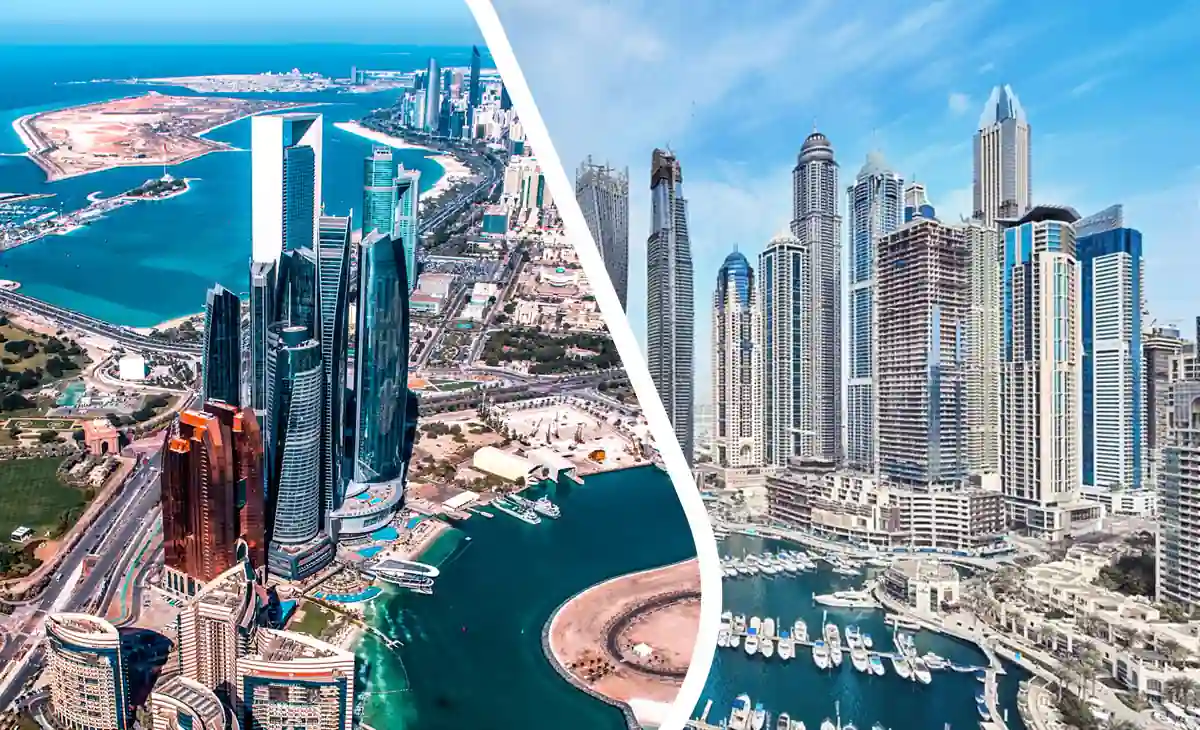
Having traveled the 140-kilometer stretch between these two metropolises countless times, I can attest that each journey feels like a shift in energy.
As Dubai’s futuristic skyline recedes in the rearview mirror, the calm, stately rhythm of Abu Dhabi gradually takes over. To compare them isn’t to declare a superior destination, but to understand their distinct personalities, shaped by different histories and visions.
Dubai is a global festival—fast, ambitious, and perpetually building the next big thing. Abu Dhabi, the nation’s capital, moves with a more deliberate pace, taking immense pride in its deep-rooted heritage and cultural refinement.
Both are powerful symbols of the United Arab Emirates’ success, yet they express it in profoundly different ways. Understanding this contrast is the key to choosing the right atmosphere for your trip, whether it’s a short layover or a life-changing move.
What to Expect from This Guide: Navigating Your Perfect UAE Experience
This guide moves beyond a simple “which is better” debate to serve as your practical map for aligning experience with purpose. We will delve into detailed comparisons of iconic tourist attractions, the overall Cost of Living, and the nuanced differences in lifestyle.
Expect honest, data-driven insights—from the average time it takes to drive from the Dubai Mall to the Sheikh Zayed Grand Mosque, to why the family-friendly vibe of Yas Island feels distinctly different from the glamorous bustle of Palm Jumeirah. Whether you’re planning a Desert safari, navigating the Public Transport system, or simply connecting through Dubai International Airport, you will find the information needed to tailor your journey.
The “Spectrum” Approach: Finding Your Fit, Not Just “Better”
 The UAE Experience Spectrum: Find your fit between Dubai’s high-energy innovation and Abu Dhabi’s serene cultural substance.
The UAE Experience Spectrum: Find your fit between Dubai’s high-energy innovation and Abu Dhabi’s serene cultural substance.
Traveling between these two cities reveals that there is no single, monolithic UAE experience. It’s more helpful to think of them as two points on a vibrant spectrum. Dubai shines at the high-energy, hyper-modern end, a city of superlatives and constant motion. Abu Dhabi anchors the other end, representing cultural depth, tradition, and serene elegance.
The true goal is to find your place on that spectrum. Are you drawn to the dizzying heights of the Burj Khalifa, the underwater marvels of Deep Dive Dubai, or the resort paradise of Atlantis – The Palm?
Or do you prefer the contemplative beauty of the Louvre Abu Dhabi, the regal grandeur of Emirates Palace, and quiet evening strolls along the Corniche? This guide is designed to match your personality, interests, and budget to the Emirate that feels like the perfect fit for you.
Dubai: The Dynamic Global Metropolis – Bustling, Bold, and Cosmopolitan
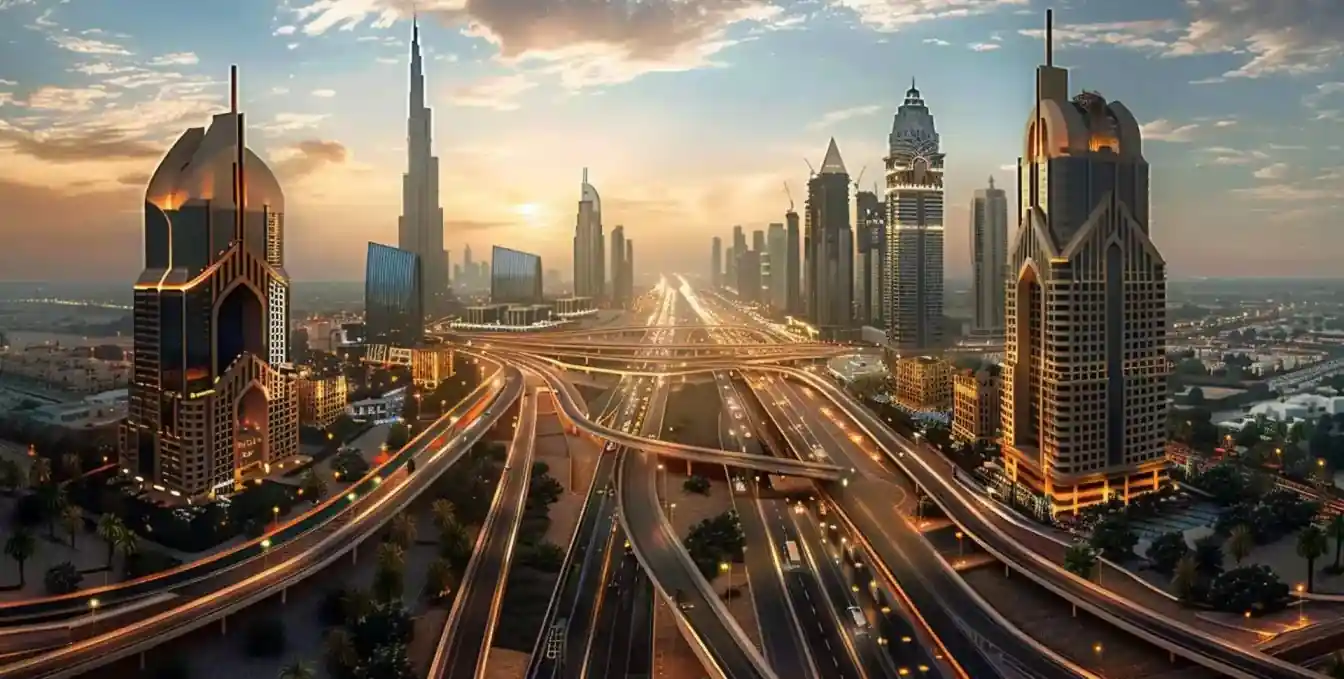
Dubai is the UAE’s kinetic energy source. From the moment you land at Dubai International Airport (DXB), the city’s ambitious pulse is palpable. It’s a city defined by its towering skylines, audacious engineering projects, and a multicultural tapestry woven from over 200 nationalities.
Neighborhoods like Downtown Dubai, Bur Dubai, and Dubai Marina seamlessly blend global business, high-end tourism, and a vibrant lifestyle into one compelling package.
Here, a typical day might involve exploring the endless corridors of the Dubai Mall, ascending the Burj Khalifa for panoramic views, and then wandering through the charming, canal-laced markets of Madinat Jumeirah. The city is exceptionally well-connected; the efficient Dubai Metro links major shopping centers and business hubs, while Ride-Hailing Services like Uber and Careem make navigating the sprawling metropolis simple and accessible.
- Atmosphere: Fast-paced, futuristic, and unapologetically global.
- Ideal for: Shoppers, thrill-seekers, entrepreneurs, and those who thrive on diversity and energy.
- Notable traits: Constant innovation, world-class entertainment, and a dynamic social scene.
Abu Dhabi: The Serene Cultural Capital – Sophisticated, Traditional, and Refined
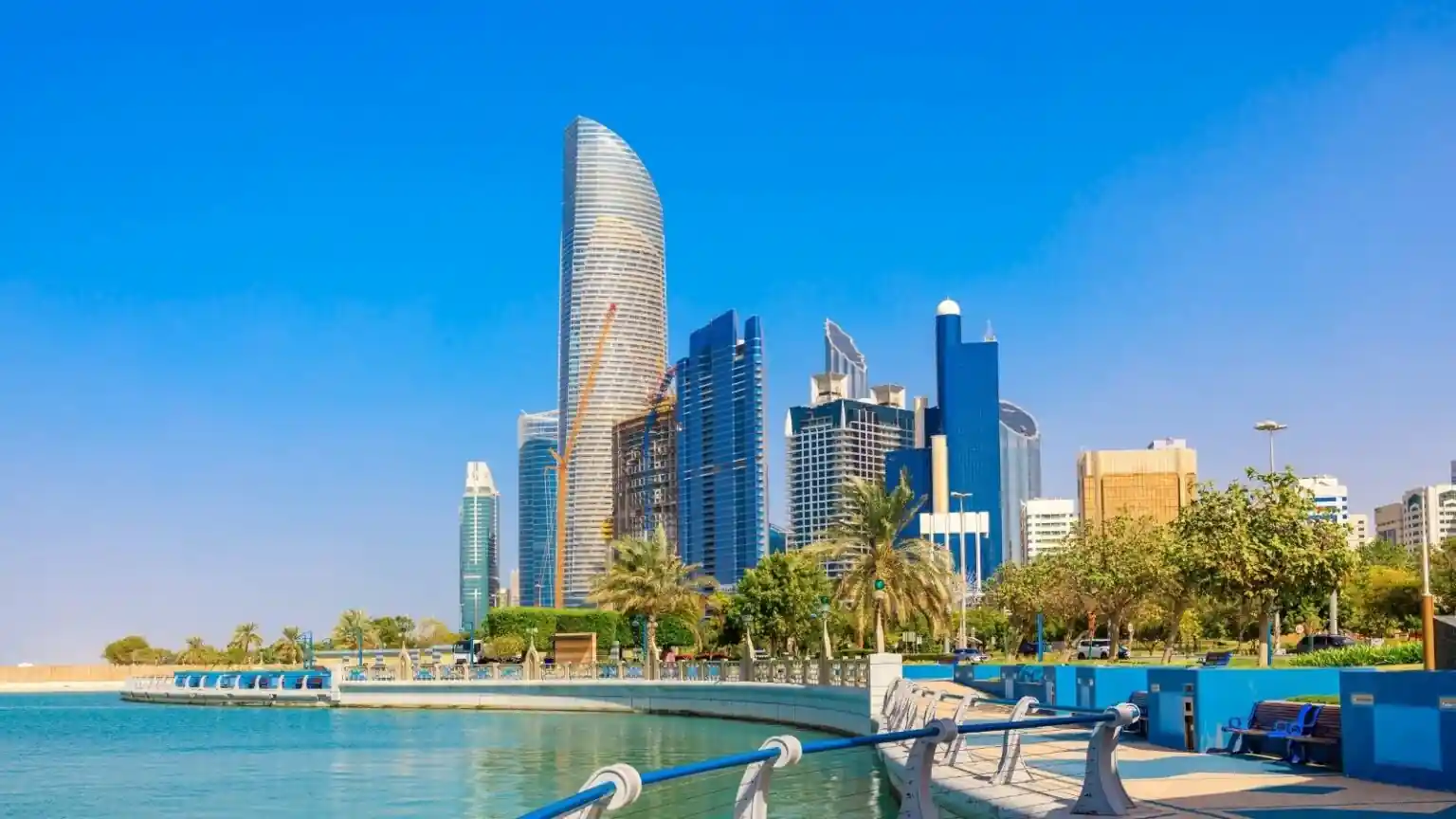
Abu Dhabi feels like a deep, calming breath after Dubai’s exhilarating rush. As the capital, it is the political and cultural heart of the nation, exuding a sense of grounded elegance. The city balances its luxurious offerings with a profound respect for Emirati tradition.
This is most evident at the Sheikh Zayed Grand Mosque, a breathtaking masterpiece of white marble and tranquil reflection that stands as a testament to Islamic art and architecture. The city’s commitment to culture continues at the Louvre Abu Dhabi and the opulent Emirates Palace, which showcase a blend of heritage and modern sophistication.
For families, the entertainment hub of Yas Island is a major draw, offering world-class attractions like Ferrari World, Yas Waterworld, and Warner Bros. World. These theme parks make Abu Dhabi a premier destination for travelers with children, offering thrills without the overwhelming crowds often found elsewhere.
- Atmosphere: Calm, family-friendly, culturally rich, and polished.
- Ideal for: Culture enthusiasts, families, and long-term residents seeking stability and a higher quality of life.
- Notable traits: Strong emphasis on heritage, world-class museums, and a more relaxed pace.
Underlying Reasons: How History and Vision Shaped Each Emirate
The distinct characters of Dubai and Abu Dhabi are rooted in their developmental histories. Dubai’s trajectory was shaped by its historic role as a trading port on the Dubai Creek.
Its leadership made an early and audacious bet on tourism, real estate, and global trade, transforming a modest desert outpost into a dazzling international playground. This vision prioritized creating a global brand built on spectacle and business-friendly policies.
Abu Dhabi, as the holder of the vast majority of the United Arab Emirates’ oil wealth, pursued a more measured and strategic path of development. Under the guidance of leaders like the late Sheikh Khalifa bin Zayed Sultan Al Nahyan, the emirate invested heavily in infrastructure, education, and landmark cultural projects designed to foster long-term stability and cultural diplomacy.
This approach aimed to build a sustainable, knowledge-based economy and a capital city that would serve as the nation’s dignified anchor.
| Aspect | Dubai | Abu Dhabi |
|---|---|---|
| Primary Focus | Global Business & Tourism | Governance & Culture |
| Pace of Life | Fast, dynamic, and ever-changing | Calm, steady, and family-oriented |
| Architecture | Futuristic, record-breaking skyscrapers | Stately, iconic cultural landmarks |
| Economic Engine | Trade, Real Estate, Hospitality | Oil, Finance, Government |
Dubai’s Dazzling Delights: Innovation, Entertainment, and Luxury Shopping
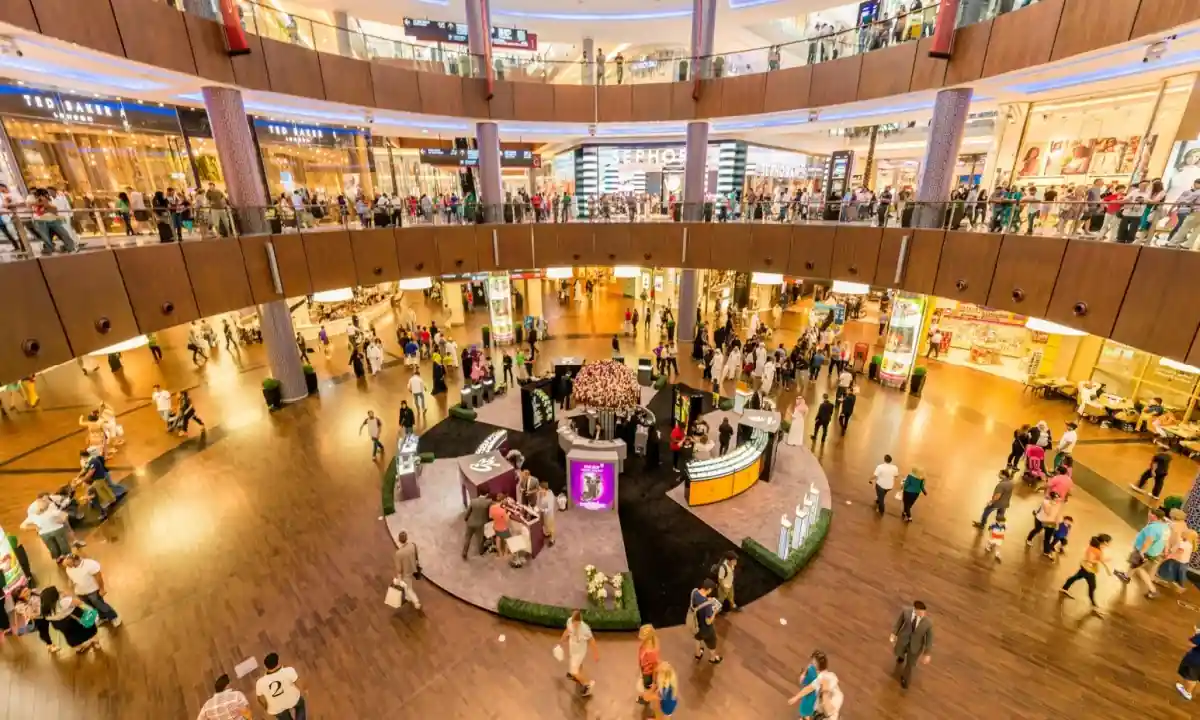
Dubai is a city engineered for the extraordinary. Everything here is designed to impress, from standing atop the Burj Khalifa, the world’s tallest building, to plunging into the world’s deepest swimming pool at Deep Dive Dubai. Mornings can be spent exploring the colossal Dubai Mall, where you can marvel at sharks in the Dubai Aquarium before browsing high-fashion boutiques.
Evenings are best spent at iconic hotels like the Burj Al Arab Jumeirah or wandering the atmospheric Madinat Souk, a modern recreation of a traditional Arab market.
Dubai’s Must-Visit Attractions:
- Burj Khalifa & Downtown Dubai: The epicenter of modern Dubai, offering unparalleled views and the spectacular Dubai Fountain show.
- The Dubai Mall & Other Shopping Centers: More than just retail destinations, these are massive entertainment complexes like Mall of the Emirates and City Centre Deira.
- Palm Jumeirah & Atlantis – The Palm: This man-made island is a marvel of engineering, home to luxury resorts, Aquaventure Waterpark, and high-end restaurants.
- Dubai Creek, Gold Souk & Spice Souk: A journey into the city’s past. Cross the creek on a traditional abra boat from Bur Dubai to explore the glittering Gold Souk and aromatic Spice Souk.
Abu Dhabi’s Cultural & Family Fun: Heritage, Arts, and Thrills
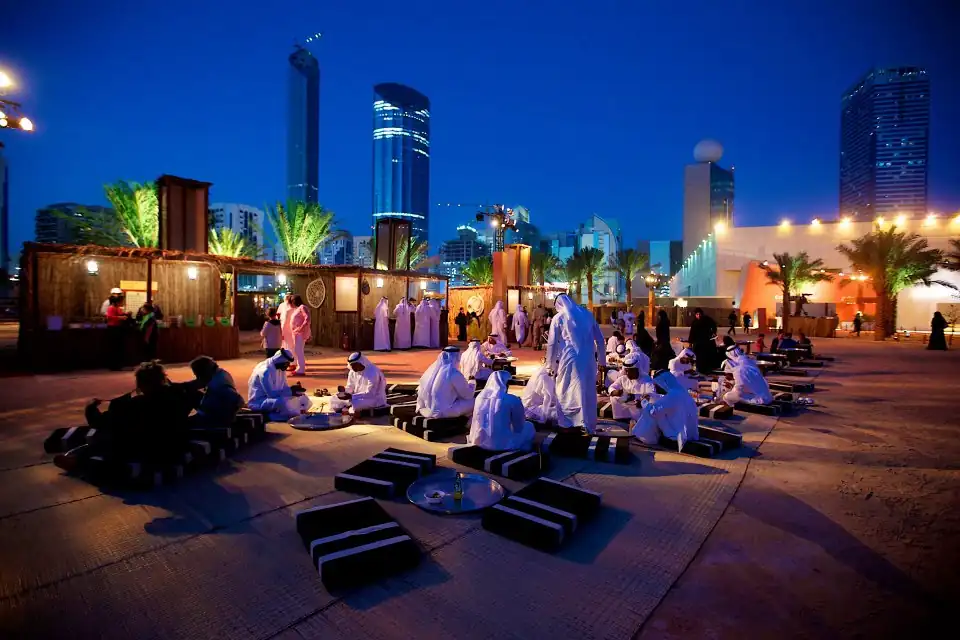
Abu Dhabi captivates travelers seeking cultural depth and a more relaxed atmosphere. The journey begins at the Sheikh Zayed Grand Mosque, an architectural marvel of such scale and beauty that it commands silent reverence. From there, the cultural path leads to the Saadiyat Island Cultural District, home to the magnificent Louvre Abu Dhabi, where global art and historical artifacts are displayed beneath a stunning, light-filtering dome.
Families often dedicate entire days to Yas Island, the city’s premier entertainment destination. Here, you can experience the adrenaline of Ferrari World, the splash-filled fun of Yas Waterworld, and the cinematic magic of Warner Bros. World Abu Dhabi. Beyond the theme parks, the city blends leisure with learning at places like the Emirates Zoo or the futuristic eco-district of Masdar City, showcasing the capital’s commitment to sustainability.
Top Things to Do in Abu Dhabi:
- Sheikh Zayed Grand Mosque: An essential visit for its breathtaking architecture and serene spiritual atmosphere.
- Louvre Abu Dhabi: A world-class museum that offers a unique journey through human creativity across cultures and civilizations.
- Emirates Palace: A landmark of luxury and Arabian hospitality, perfect for afternoon tea or simply admiring its grandeur.
- Yas Island Attractions: A consolidated hub of theme parks and entertainment venues perfect for family fun.
Tailoring Your Trip: Which City Suits Your Travel Style?
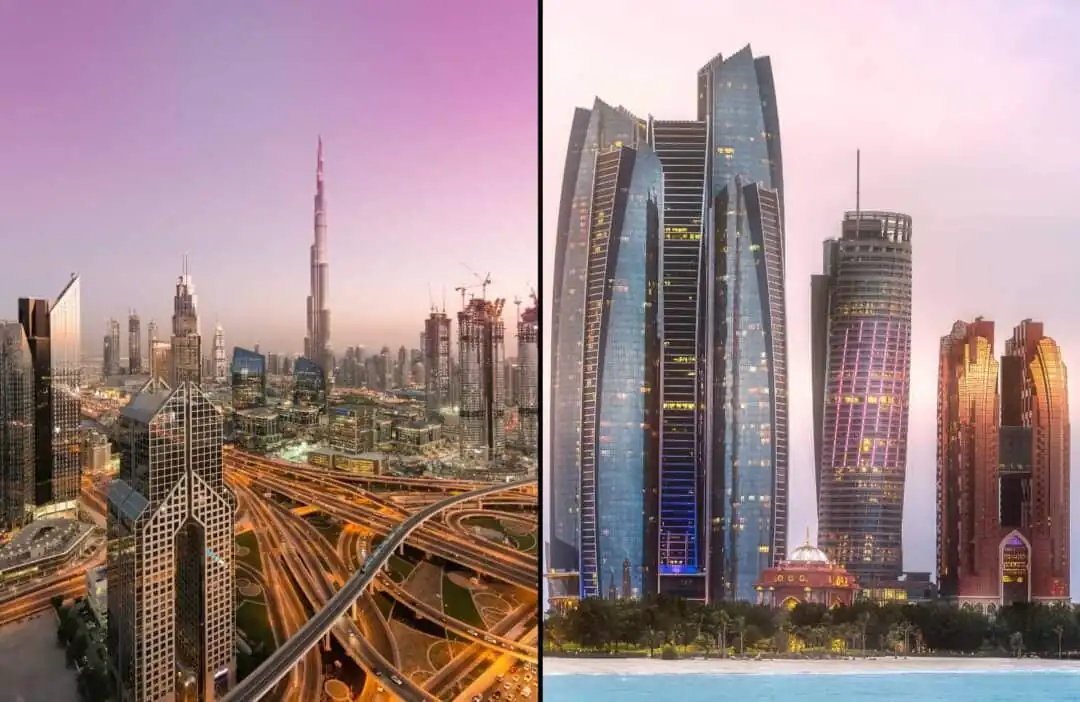
Choosing between the two ultimately depends on your personal rhythm and the primary purpose of your visit. Use this quick guide to find your best match:
| Traveler Type | Best Match | Why |
|---|---|---|
| Adventure Seekers & Thrill-Seekers | Dubai | Skydiving over Palm Jumeirah, deep-sea diving, world-class waterparks, and exhilarating Desert safari experiences. |
| Culture Lovers & Art Enthusiasts | Abu Dhabi | Home to the Sheikh Zayed Grand Mosque, Louvre Abu Dhabi, and a burgeoning arts scene in a more traditional setting. |
| Families | Abu Dhabi | The concentrated attractions on Yas Island, a safer and calmer environment, and a more relaxed, family-oriented vibe. |
| Shoppers & Nightlife Fans | Dubai | Unmatched shopping centers like Dubai Mall, the traditional Gold Souk, luxury designer stores, and a vibrant club scene. |
| Budget-Conscious Travelers | Abu Dhabi | Generally lower costs for hotels, dining, and some attractions, offering better value for money. |
Many travelers choose to experience both. Thanks to the short distance between them, it’s easy to stay in one city and take a day trip to the other to get a taste of both worlds.
Housing & Accommodation: Rent Per Month, Short-term Rental, Housing Options, Real Estate ROI
The difference in the Cost of Living between Abu Dhabi and Dubai is most apparent in the housing market. Dubai’s real estate scene is larger and offers more diverse housing options, but this comes at a premium.
According to data from platforms like Bayut, rent in central Dubai districts like Downtown or Dubai Marina can be 15-25% higher than in comparable Abu Dhabi neighborhoods like Al Reem Island or the Corniche.
- Average Rent Per Month (1-Bedroom Apartment, City Center):
- Dubai: Approximately 7,500–9,500 AED
- Abu Dhabi: Approximately 6,000–7,500 AED
The short-term rental market is significantly more developed in Dubai, with a vast inventory on platforms like Airbnb, catering to tourists and business travelers. Abu Dhabi, in contrast, has traditionally favored long-term leases, reflecting its more settled, resident-focused population. For real estate investors, Dubai often promises a higher Real Estate ROI due to its dynamic market and high tourism demand, while Abu Dhabi offers more stable, predictable returns.
Transportation Costs: Navigating the Cities
Dubai’s integrated public transport system is a model of modern efficiency, anchored by the extensive Dubai Metro. A single trip on the metro is affordable, and the network conveniently connects the airport, major malls, and key business districts.
In contrast, Abu Dhabi’s residents have historically relied more on private cars and taxis. While the city has a clean and modern bus network, it is less comprehensive than Dubai’s metro system.
Car Ownership is common and relatively affordable in both emirates due to low fuel prices. However, Dubai drivers must account for the Salik toll gate system, which adds a small charge to trips on major highways. Looking ahead, the development of the Etihad Rail network promises to revolutionize travel between the emirates, creating a fast, sustainable link that will further shrink the distance between these two hubs.
Daily Expenses: Groceries, Dining Out, and Entertainment
When it comes to the day-to-day Cost of Living, Abu Dhabi generally proves to be slightly more affordable. Grocery and Food Costs are typically 5-10% lower than in Dubai. A weekly shopping cart filled with essentials will likely cost less in the capital. This trend extends to dining out; while Dubai offers an unparalleled variety of high-end restaurants, casual meals in Abu Dhabi tend to offer better value.
Entertainment expenses also differ. Dubai’s world-famous attractions, from the Burj Khalifa to a luxury Desert safari, often come with premium price tags. Abu Dhabi’s attractions, particularly family-oriented ones on Yas Island, can be more budget-friendly.
Even shopping for clothing and shoes reflects this. While both cities have massive shopping centers, a pair of Levi’s 501 jeans or Nike Running Shoes in a chain store might have the same price, but overall discretionary spending on entertainment and leisure tends to be higher in Dubai due to the sheer volume of options.
Utilities & Other Necessities
Utility Expenses for electricity, water, and cooling are comparable in both cities, though costs in Abu Dhabi can sometimes be slightly lower. Mandatory expenses like internet and mobile plans are offered by the same providers across the United Arab Emirates, with similar pricing structures.
A significant differentiator in the Cost of Living for residents is the cost of Education and Childcare. While both cities offer excellent international schools, tuition fees in Dubai are, on average, 10-20% higher than in Abu Dhabi. Similarly, Healthcare Costs can vary. Dubai has a larger private healthcare sector with more choices, which can lead to higher insurance premiums and out-of-pocket expenses. Abu Dhabi has a robust public healthcare system alongside private options, often resulting in lower overall healthcare expenditures for residents.
The Overall Cost of Living Index: Perceptions and Reality
According to the latest data from Numbeo’s Cost of Living Index, Dubai consistently ranks as more expensive than Abu Dhabi. While the gap is not enormous, it is noticeable across key categories like rent, restaurants, and consumer prices. This difference is largely driven by Dubai’s status as a global tourism and business hub, which fuels higher demand and prices.
However, it’s crucial to look beyond the numbers. Both cities offer an exceptional quality of life, outstanding infrastructure, and remarkably low crime rates. In fact, Abu Dhabi frequently tops the global safety index as the world’s safest city. Ultimately, the choice comes down to priorities: Dubai offers unparalleled global connectivity and amenities at a higher cost, while Abu Dhabi provides a more balanced, affordable, and secure lifestyle.
Connectivity & Travel: Between and Within the Emirates
The United Arab Emirates is exceptionally well-connected, making travel between its major cities seamless. The distance between Abu Dhabi and Dubai is approximately 140 kilometers, a comfortable 90-minute drive along the modern E11 highway. Affordable and frequent intercity buses offer another convenient option for commuters and tourists.
Within the cities, Dubai’s extensive Public Transport network, led by the Dubai Metro, gives it an edge in convenience for non-drivers. It connects key attractions from the historic Dubai Creek to the modern Marina. Abu Dhabi is more of a driver’s city, though its public bus system is clean and reliable. For air travel, Dubai International Airport (DXB) is one of the world’s busiest hubs, connecting the region to virtually every corner of the globe. As connectivity evolves, the future Etihad Rail project will make moving between the emirates even more efficient, further blurring the lines for residents and visitors.
Safety & Security: A Secure Environment for All Travelers and Residents
Both Dubai and Abu Dhabi are consistently ranked among the safest cities in the world. The overall safety index for both emirates is exceptionally high, with violent crime being extremely rare. This powerful sense of security is a cornerstone of the resident and tourist experience, allowing people to walk around late at night in areas like Dubai Marina or the Abu Dhabi Corniche without concern.
This safety is maintained through a combination of community-focused policing, strict laws, and the use of advanced technology. Visitors and residents should always be respectful of local laws and cultural customs regarding public behavior and dress. For families, solo travelers, and women, the UAE provides a uniquely secure environment where you can explore everything from bustling markets like the Gold Souk to serene beaches with complete peace of mind.
Visa & Entry Requirements: Simplifying Your Arrival
The United Arab Emirates has one of the most streamlined visa policies in the world, making it easily accessible for tourists. Citizens of many countries, including the US, UK, Canada, Australia, and most of Europe, are eligible for a free visa on arrival, typically valid for 30 or 90 days. The process at both Dubai International Airport and Abu Dhabi International Airport is fast and efficient. Always ensure your passport is valid for at least six months from your date of entry.
For those considering a longer stay, both emirates offer various long-term residency options under the UAE visa rules, including freelance permits, property investor visas, and the prestigious Golden Visa program. These initiatives are designed to attract skilled professionals, entrepreneurs, and investors, making relocation a relatively straightforward process.
Climate & Best Time to Visit: Planning Your Trip for Comfort
The UAE has a hot desert climate characterized by mild winters and scorching summers. The best time to visit either Dubai or Abu Dhabi is between October and April, when the weather is pleasantly warm and sunny, with average temperatures ranging from 24°C to 30°C. This period is ideal for outdoor activities like visiting the beach, enjoying a Desert safari, or exploring outdoor tourist attractions like the Dubai Miracle Garden.
From May to September, temperatures can soar above 40°C with high humidity, making outdoor exploration challenging during the day. However, this is also the low season, with fewer crowds and lower hotel prices. During these months, life moves indoors to the cities’ world-class, air-conditioned shopping centers, theme parks like Ferrari World, museums, and entertainment venues.
Career Opportunities & Job Market: Distinct Sectors and Growth Areas
While both Dubai and Abu Dhabi offer attractive career prospects for expatriates, their job markets are focused on different sectors. Dubai’s economy is highly diversified and dynamic, with strong opportunities in tourism, hospitality, logistics, technology, media, and real estate. It is a hub for multinational corporations and startups, fostering a fast-paced, entrepreneurial work culture.
Abu Dhabi’s job market is more stable and structured, anchored by the government, oil and gas, finance, and defense sectors. It offers excellent opportunities in public service, engineering, healthcare, and education. While salaries are competitive in both cities, roles in Abu Dhabi’s public sector often come with more comprehensive benefits packages and greater job security, making it an attractive option for professionals seeking long-term stability.
Education & Childcare: Finding the Right Schools and Nurseries
For families considering a move, the quality and cost of Education and Childcare is a critical factor. Both Dubai and Abu Dhabi boast a wide range of high-quality international schools offering British, American, IB, and other global curricula.
Dubai has a larger number of schools, providing more choice but also commanding higher fees, particularly in premium institutions. Abu Dhabi, in line with its more family-centric focus, generally offers slightly lower tuition fees, and the school system is known for its strong regulatory standards. This can make a significant difference in the overall Cost of Living for expatriate families. Similarly, childcare and nursery options are plentiful in both cities, catering to the needs of working parents.
Community & Social Scene: Building a Life and Finding Your Tribe
Dubai’s social scene is as diverse and fast-paced as the city itself. It’s a melting pot of cultures where it’s easy to meet people from all over the world at weekend brunches, beach clubs, networking events, and art gallery openings. The transient nature of the city means social circles can change quickly, but there are endless opportunities to connect with like-minded individuals.
Abu Dhabi offers a more tight-knit and community-oriented social life. Expat circles often form around schools, residential compounds, and recreational clubs. Life is more relaxed, with weekends often spent enjoying family time at the beach, parks, or cultural events. This calmer pace can make it easier to build deeper, long-lasting friendships. Niche communities also thrive; for instance, both cities are becoming popular ports of call for major Cruise Lines, leading to vibrant online Cruise Conversations and meetups among UK Cruising and Canadian Cruisers communities.
Healthcare Access & Quality: Understanding the System for Residents
The healthcare sector across the United Arab Emirates is of an exceptionally high standard, with state-of-the-art facilities and internationally trained medical professionals. Health insurance is mandatory for all residents in both Dubai and Abu Dhabi.
Dubai is renowned for its large and competitive private healthcare market, offering a vast choice of hospitals, specialty clinics, and wellness centers. This competition can sometimes lead to higher Healthcare Costs and insurance premiums. Abu Dhabi also has excellent private facilities but is distinguished by its strong public healthcare network, which provides high-quality, affordable care to residents. This makes the capital particularly appealing for those prioritizing comprehensive and cost-effective healthcare coverage.
Real Estate & Investment: Options for Long-Term Housing and Returns
When it comes to real estate, the choice between Dubai and Abu Dhabi depends heavily on investment goals. Dubai’s market is larger, more volatile, and driven by international demand. It offers higher potential for short-term capital gains and strong Real Estate ROI from short-term rental properties, particularly in tourist-heavy areas like Dubai Marina and Downtown.
Abu Dhabi’s property market is more stable and end-user-driven. While it offers fewer freehold areas for foreign investors, it provides consistent rental yields and long-term value appreciation. Investors who prioritize stability and a less speculative market often find Abu Dhabi’s rental properties to be a more secure investment. Both cities feature stunning modern architecture and high-quality construction standards across their diverse housing options.
Seamless Travel Logistics: Practical Tips for Visiting Both Emirates
Experiencing both Dubai and Abu Dhabi on a single trip is not only feasible but highly recommended for a complete picture of the United Arab Emirates. The short distance and excellent infrastructure make commuting between them effortless.
A great strategy is to fly into Dubai International Airport (DXB) and spend a few days immersing yourself in its dynamic energy. Visit the Burj Khalifa, shop at the Dubai Mall, and explore the historic Dubai Creek. After experiencing the buzz, rent a car or take an intercity bus for the scenic 90-minute drive to Abu Dhabi.
Once there, shift to a slower pace. Dedicate ample time to the cultural landmarks like the Sheikh Zayed Grand Mosque and the Louvre Abu Dhabi. A day on Yas Island offers a perfect dose of family fun at attractions like Ferrari World before you depart.
Embracing the Spectrum: Your Personal Preference Reigns Supreme
The truth is, there’s no single winner in the Abu Dhabi vs Dubai debate. The cities complement each other rather than compete. Dubai races ahead with innovation, global events, and nightlife, while Abu Dhabi holds onto its grace, culture, and composure.
If you’re visiting the United Arab Emirates for a short trip, combine both for a complete experience—modern thrills in Dubai, followed by tranquil days in Abu Dhabi. For those staying longer, weigh your pace, budget, and career goals.
In the end, both Emirates deliver what travelers and residents value most: opportunity, comfort, and safety. Whether you’re chasing city lights or cultural calm, your UAE story will fit somewhere perfectly between the two.
FAQs
1. Is there a difference between Abu Dhabi and Dubai?
Yes. Dubai is the entertainment and business hub, fast-paced and diverse. Abu Dhabi is calmer, focusing on culture, heritage, and government institutions.
2. Abu Dhabi vs Dubai: Which is better to stay?
For short visits, Dubai offers more hotels and activities. For long-term stays, Abu Dhabi’s slower rhythm and lower costs suit families and professionals better.
3. Which is the better city in the UAE 2024, Dubai or Abu Dhabi?
It depends on your purpose. Dubai leads in tourism and nightlife, while Abu Dhabi excels in stability, safety, and culture.
4. What are the main differences between Abu Dhabi and Dubai?
Dubai is busier and trend-focused; Abu Dhabi is quieter and traditional. Think of Dubai as modern luxury, Abu Dhabi as refined elegance.
5. How do the economies of Abu Dhabi and Dubai differ?
Abu Dhabi’s wealth comes largely from oil and public investment. Dubai relies on tourism, trade, and real estate to drive its growth.
6. How do living costs in Abu Dhabi compare to those in Dubai?
Dubai costs around 8–10% more overall, especially in rent and entertainment. Abu Dhabi remains slightly cheaper for families.
7. Which city offers better job opportunities: Abu Dhabi or Dubai?
Dubai offers more diversity in private-sector jobs. Abu Dhabi provides stability and better benefits in government-linked sectors.






